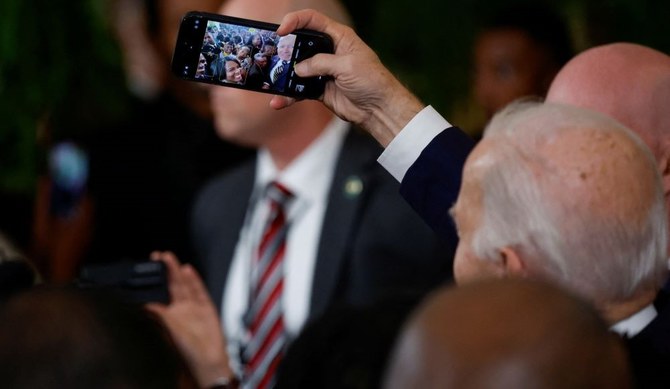
US President Joe Biden has fulfilled his promise and launched a military attack against Iran. The attacks were “against” Iran in the most flexible and loosest sense of the term. Indeed, Iranian territory was not hit and the attack did not intend to inflict a decisive military defeat on the Tehran regime that would achieve the attack’s political objective.
Instead, as we expected — given the approach the last two Democratic administrations have taken — the attacks targeted Arab territory within Tehran’s political and military sphere of influence. Moreover, they were launched for psychological reasons and to meet the need to retaliate during an election year, a time when a president’s administration cannot be made to appear weak in the face of challenges.
Anyway, Hossein Akbari, the Iranian ambassador to Syria, quickly reassured us that not a single Iranian had fallen as a result of the dozens of US airstrikes. It thus becomes clear that the objective of “sending a message of deterrence” was not achieved … leaving aside the fact that the US had never intended for it to be a decisive blow.
The attack was undoubtedly calibrated by Washington. Accordingly, we were told that the recent attack was “only one part of the US response” to the attack on the Al-Tanf base in the Syrian desert near the Iraqi-Syrian-Jordanian border triangle.
In fact, something is becoming increasingly evident with every negotiation interval, using live ammunition, between the groups known as “the Great Satan” (the US) and “the Little Satan” (Israel) and the “axis of resistance”: There is no end in sight for the ongoing competition over how to share the region within the framework of the so-called rules of engagement.
I believe that our brothers in Palestine have now realized — even if they had chosen to avoid skepticism before — that the Iranian regime will not fight in their defense … although it has never missed an opportunity to exploit their cause, their fate, their dreams and their suffering.
The mission to “eliminate Israel within seven minutes” has been forgotten despite the destruction seen in the Gaza Strip and the martyrdom and injury of tens of thousands of its people.
It turns out that “unity of the arenas” — a concept that many had promoted and believed in — only applies to the Arab territory occupied by Iran. On the other hand, Iranian territory remains unthreatened by direct retaliation.
Also, despite the intensity of the artillery and all the smoke rising from the shelling on the Lebanese-Israeli border front, the military operations have evidently been targeted. They are targeting settlements that have already been evacuated.
Accordingly, the goal is to silence the Lebanese skeptics and to save face for the Iran axis … even after the assassination of senior Hamas leader Saleh Al-Arouri in the Hezbollah stronghold of Beirut’s southern suburbs. Of course, this was paralleled by Washington’s insistence on “preventing regional escalation” to allow Israel to focus solely on Gaza.
Indeed, this applies even at sea. The Red Sea has become a front for posturing and oneupmanship, another episode in the ongoing “negotiations.” Once again, Washington has demonstrated that it intended to deal with the Tehran regime on a case-by-case basis as it puts all of its weight behind the Israeli war to destroy the Gaza Strip. And again, we recall how quickly the White House announced that “there is no evidence of Tehran’s involvement” within hours of the attack on Oct. 7.
Tehran is using slogans of ‘liberating Jerusalem’ as cover to fight us and not those who are occupying Jerusalem.
Eyad Abu Shakra
I genuinely do not mean to incite Washington and Tel Aviv against Iran’s people, land and culture. Iran is a neighbor with whom we have had ties for thousands of years.
That is absolutely not my intention. Iran is an integral part of the region and our civilizations have been linked for centuries. We have both taken and given much to each other. Only the delusional could refuse to acknowledge what this ancient civilization has contributed to our Arab and Islamic world, and indeed to the entire world, through the contributions of its innovators and geniuses to theology, philosophy, science, culture, art and administration.
To put it briefly, Iran is not alien to the region, nor are we alien to it. It remains close to us, even when its rulers seek, from time to time, to deny our brotherhood, coexistence and understanding.
Our real problem with Tehran is that, using slogans of “liberating Jerusalem” as cover, it is fighting us and not those who are occupying Jerusalem. Washington and Tel Aviv are well aware of this fact.
Over the past few years, US administrations have, on the surface, sought to curb the excesses of Israel’s right-wing extremists and prevented them from attacking Iran.
Throughout this period, Tehran has expanded its destructive occupation of Arab territories — especially in Iraq, Syria and Lebanon — through its sectarian militias, under the pretext of fighting Israel to liberate Palestine. The fascist right wing in Israel, the Likud, has reaped the benefits of overblowing the threat of the “Iranian ogre” to dominate Israeli politics.
As a result, fears of Iranian expansion led some Arabs to accept and normalize relations with Israel, while Israel’s extremism pushed other Arabs to accept subservience to Tehran’s mullahs and their Revolutionary Guards.
Meanwhile, Washington was comfortable giving directions on both sides, politically, academically and in the media.
The countries of the Arab Levant have fallen. Their wealth has been plundered and their social fabric has been torn. They have witnessed the broadest sectarian ethnic cleansing in centuries. Despite this, American decision-makers (with Israeli suggestion and support) are still racing to find “strategic justifications” for Washington’s reluctance to put an end to the unrestrained Tehran regime.
Eyad Abu Shakra is managing editor of Asharq Al-Awsat. X: @eyad1949












